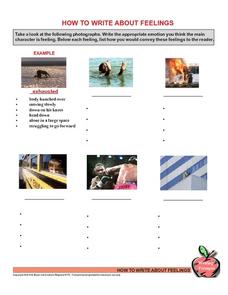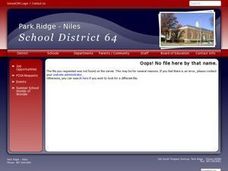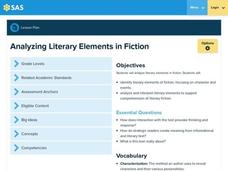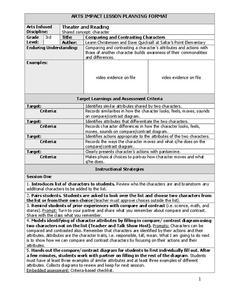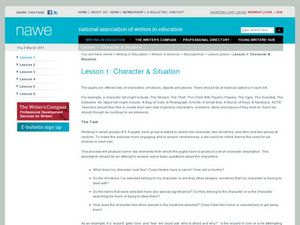Curated OER
How Characters Affect the Plot
How do a character’s feelings and actions influence the plot of a story? The interaction between character and plot is explored in this lesson that uses When Charlie McButton Lost Power to launch the discussion. Charlie’s love of...
Curated OER
Lesson Plan 4: Creating Main Characters
Creating a good main character is a must when writing a creative narrative or novel. Elementary aged writers create main characters for the novel they are writing. They first use themselves as a models, then create a character as a...
Curated OER
How to Write About Feelings
This worksheet presents a clever way to help students practice writing about feelings. In it, six photographs are shown. Below the photos are a line for a feeling word, then some bullet points to write phrases which match what the person...
Curated OER
How We Feel
Learners examine how their feelings make them unique. They read and discuss a poem, develop a list of feelings, and create a drawing of them feeling happy and healthy.
Curated OER
Lesson 3: Looks, Actions, and Feelings
Remember that boy David from the David, No! books? He's back, and youngsters draw a picture of him from a scene in the book David Goes to School. They write a sentence describing his appearance, actions, and feelings...
Pearson Longman
Emotions Reading
Explore the many types of feelings and how people express them with a activity compiled of kid-friendly activities that spark critical thinking, self-reflection, and reinforce language and writing skills. Scholars delve into the variety...
Curated OER
An Author Study on Kevin Henkes
To better understand how the author Kevin Henkes uses the theme of friendship throughout his books, learners engage in several compare and contrast activities. The class reads several Henkes titles and discusses the similarities in...
Pennsylvania Department of Education
Analyzing Literary Elements in Fiction
Students analyze the characters and events in fictional writing. In this literary elements lesson, students study the meaning of the words characterization and fiction. They listen to the story Pigsty by Mark Teague, or any other book...
Curated OER
Character Traits in Fables
Combining art, music, dance, and reading comprehension, this instructional activity is geared to reach all ability levels. After reading a variety of fables and discussing story elements and character traits, class members select a moral...
Curated OER
Character Study
Third graders work in pairs to choose two characters and find their similarities and differences. In this character instructional activity, 3rd graders compare characters by their actions and attributes. Students individually...
Curated OER
Changes in Character
Third graders read the book Hi New Baby! and identify how the main character changes throughout the story. In this character lesson plan, 3rd graders write descriptive clues to explain the changes in feelings of the character.
National Association of Writers in Education
Character and Situation
Delve into narrative writing that puts choice in the hands of the writers. Kids pick their own characters, emotions, items, and places from a list and tie them together in the exposition. Several questions help guide the writers toward...
Curated OER
Fortune Cookies Motivate Writing
Fortune cookies are used as motivation for a story. In this creative writing lesson, young writers review the six traits process. They discuss interesting characters, setting, problem and solution in a story. Original stories based on...
EngageNY
Close Reading of The Boy Who Loved Words: How Do People Build Their Word Power?
Third graders practice the skills of identifying the main message in a story, describing the main character, and sorting the key details of a story into specific categories. The story they read is, The Boy Who Loved Words. Using a...
Museum of Disability
Ian’s Walk and Apples for Cheyenne
Help young learners understand friendship and empathy with two reading comprehension lessons. Each lesson focuses on a story about a child with autism, and encourages readers to compare and contrast the characters to each other and to...
Curated OER
How Fast Are You?
Students explore constructive ways of handling conflict. In this conflict resolution instructional activity, students brainstorm things that make them angry, sad, happy, etc. Students listen to a story and identify ways the characters...
Curated OER
How We Feel
Students read and discuss a simple rhyme. They are taught how their feelings make them unique. Students are taught ways to be healthy. They are shown what to do when they don't feel well. Students use drawing and writing skills to...
Curated OER
The True Confessions of Charlotte Doyle: Graphic Organizer
After completing the first five chapters of The True Confessions of Charlotte Doyle By Avi, use direct quotes to make inferences about how Charlotte feels about certain characters. Later, when the novel has concluded, revisit...
Anti-Defamation League
Say Something: Discussion Guide for Grades 2-4
Empower pupils to stop bullying when they see or experience it with a lesson that showcases the book, Say Something by Margaret Paula Moss. After reading the tale and thoughtfully discussing its characters, they share their own...
Curated OER
Inferring Character Traits
Here is a lesson which is "flexible," and can operate as an individual or whole class activity. After reading a book of their choosing, with the use of a semantic map, learners identify character traits. They infer how their feelings...
Curated OER
Guest Readers
Young readers explore reading comprehension by creating a class presentation. In this storytelling lesson plan, puils read an assigned text in class and analyze the characters, settings and story. They create an illustrated presentation...
Overcoming Obstacles
Becoming a Good Friend
A lesson puts a spotlight on becoming a good friend. After pointing out TV friendships, scholars listen to several scenarios and discuss whether the characters exhibit good or bad friendly behaviors. Learners reflect on the...
Curated OER
Story Creation Magic: Character, Setting, Plot
Students review the terms plot, setting, and characters and examine how all of these elements are needed to make a story. They are given parts of stories and they try to identify all of those parts of the story.
Curated OER
Presenting Your Case
Pupils write letter from historical figure's point of view using proper letter writing conventions, write about two props/artifacts that are representative of their subject's life, and use Internet resources to gather images to use in...


